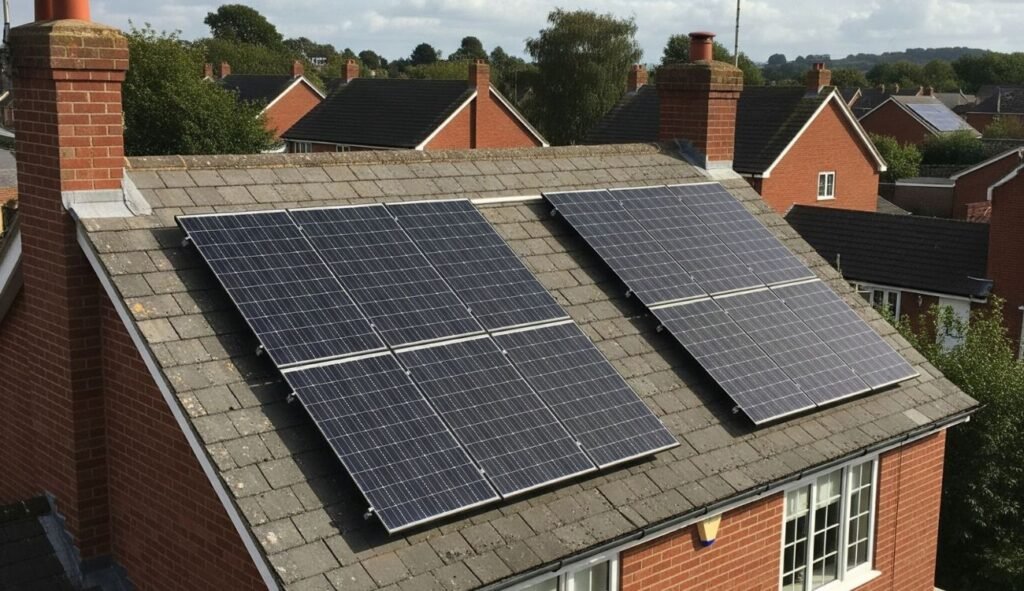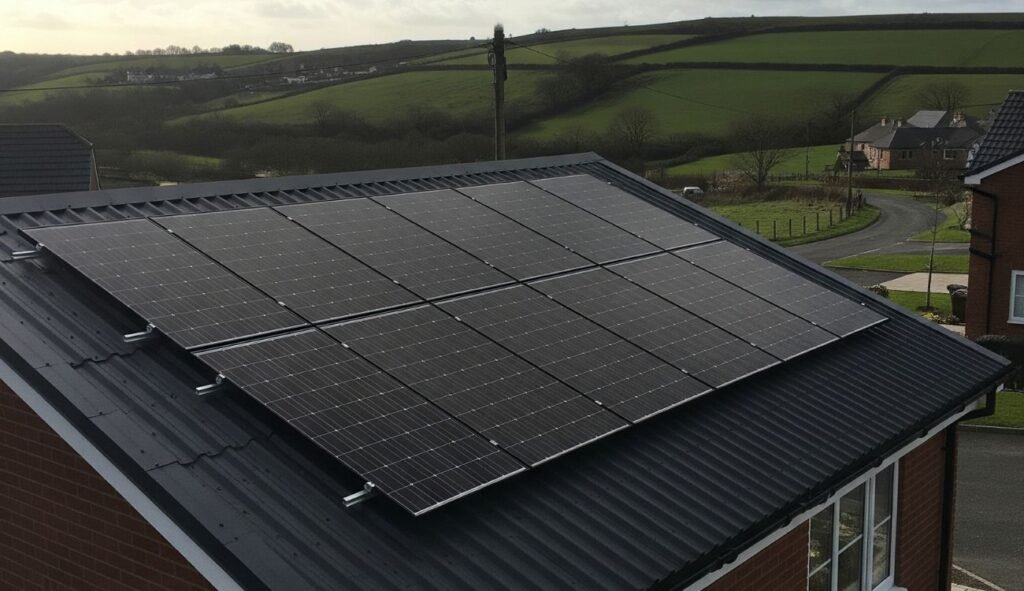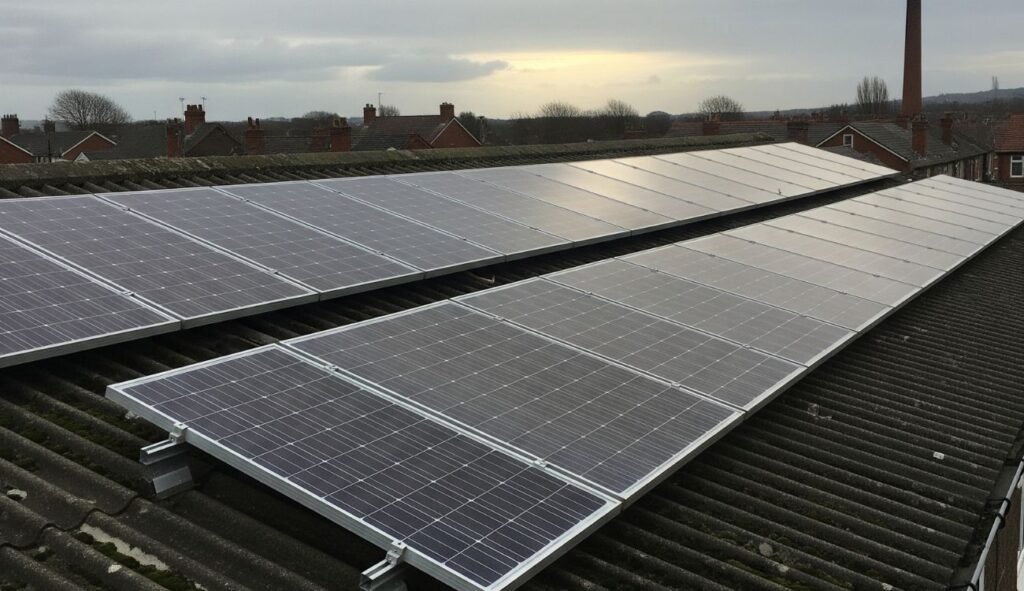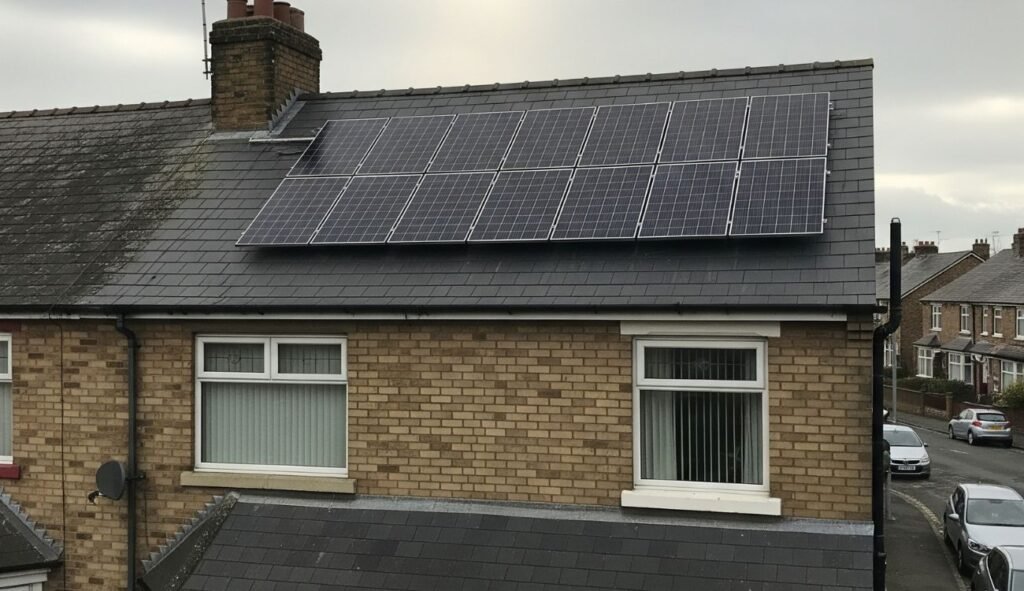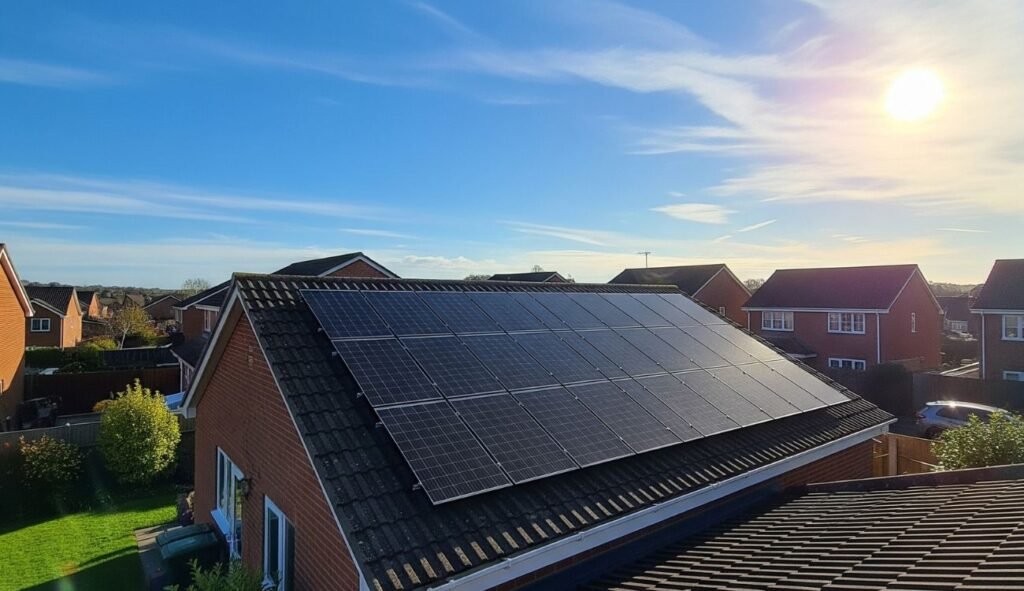Wondering how many solar panels you need for your home in Newcastle or the North East? On average, a typical household in the UK will need between 8 and 12 solar panels to meet its energy needs. However, this can vary depending on your energy usage, roof size, and where you live.
In this expert guide, we’ll show you exactly how to calculate the number of panels you need and explain all the key factors that affect system size, from electricity usage and panel efficiency to property type and location.
How Do I Calculate How Many Solar Panels I Need for My Home in the UK?
To calculate how many solar panels you need, you’ll need three key pieces of information:
- Your annual electricity usage in kilowatt-hours (kWh)
- The output of each solar panel in kWh per year
- Your location and roof suitability, which affect system efficiency
Once you have these, you can use a simple formula to estimate the right number of panels.
What’s the Average Number of Solar Panels Needed for a UK Home?
Most UK homes will need between 6 and 16 panels. Here’s a quick benchmark based on typical homes:
| Home Size | Typical Annual Usage (kWh) | Estimated Number of Panels |
|---|---|---|
| 1–2 bedroom flat or small house | ~2,000 kWh | 6–8 panels |
| 3-bedroom semi-detached house | ~3,200–4,000 kWh | 10–12 panels |
| 4+ bedroom detached house | ~4,500–6,000+ kWh | 14–16 panels |
What Formula Can I Use to Estimate How Many Panels I Need?
You can use this formula:
Annual electricity usage (kWh) ÷ Panel output per year (kWh) = Number of panels
For example:
If you use 3,500 kWh/year and choose a 350W panel (which produces around 320 kWh/year in the UK):
3,500 ÷ 320 ≈ 11 panels
Can I Use My Electricity Bill to Work This Out?
Yes. Look at your bill for “annual usage” or “yearly consumption.” It’s usually listed in kWh. If you can only find monthly usage, multiply it by 12.
What Factors Affect How Many Solar Panels I Need?
The number of solar panels your home needs isn’t just about energy use. Many variables, including your panel choice, location, roof direction, and even whether you want full or partial offset – will influence the final number.
How Much Electricity Do I Use in a Year?
UK households fall into rough categories:
- Low usage: ~1,800 kWh/year (single flat occupants)
- Medium usage: ~3,200–3,800 kWh/year (average family homes)
- High usage: 4,500+ kWh/year (larger households or electric heating/EVs)
What Is the Wattage and Efficiency of the Panels I’m Considering?
Solar panel wattage varies:
- 250W: Older, less efficient panels
- 350W: Modern standard (≈1.7m² in size)
- 400W+: High efficiency, fewer panels needed
Higher-wattage panels allow you to meet energy needs with fewer units, ideal if roof space is limited.
How Does My Location in the UK Impact Solar Panel Output?
Sunlight levels vary:
- Southern UK: More sun, higher output (~950–1,100 kWh/kWp/year)
- Northern UK: Less sun, lower output (~800–950 kWh/kWp/year)
Let Future Heat’s local experts assess your property and provide a tailored quote. As MCS-certified solar installers based right here in the North East, we understand the unique conditions across Tyne & Wear, Newcastle, and surrounding areas. Request your free solar panel installation quote today.
What Direction and Angle Is My Roof?
- South-facing roofs: Ideal for year-round solar gain
- East/West: Still viable, slightly reduced efficiency
- Flat or shaded roofs: Lower output or need optimised setups
Do I Want to Cover All or Just Some of My Energy Usage?
Some people aim for full offset of their energy bills, while others size systems for partial coverage, especially if adding battery storage or joining a Smart Export Guarantee (SEG) scheme.
How Many Solar Panels Do I Need for Different Property Types in the UK?
Typically, between 6 and 16 panels are used for homes in Newcastle and surrounding areas, depending on the size and energy demand of the property.
Every home is different, and your property type plays a major role in determining how many solar panels you’ll need. Below, we break it down by common UK housing types so you can easily benchmark your home.
1–2 bedroom flat or small home
These smaller homes typically use around 1,800–2,500 kilowatt-hours (kWh) of electricity per year.
You’ll likely need 6 to 8 solar panels, which will form a 2.1 to 2.8 kW solar system — enough to cover a good portion of your annual electricity needs.
3-bedroom semi-detached house
A typical family home like this uses about 3,200–4,000 kWh per year.
To meet that demand, you’ll need 10 to 12 panels, generating a 3.5 to 4.2 kW system.
4+ bedroom detached property
Larger homes tend to consume more electricity — usually 4,500 to 6,000+ kWh annually.
You’ll likely need 12 to 16 panels, producing between 4.5 and 6 kW of power.
Off-grid or high-usage properties
If your home uses over 6,000 kWh a year, for example, if you have an electric vehicle, electric heating, or live off-grid, your energy needs will be higher.
These homes may need 16 to 20+ panels and are often paired with battery storage to store excess electricity for evening use or cloudy days.
How Much Roof Space Do I Need for Solar Panels?
Even if your energy needs are clear, you must ensure you have enough space for your desired system. This section will help you visualise how much space you’ll need and understand typical solar panel sizing.
What Is the Typical Size of One Solar Panel?
Most 350w panels are around 1.7 m² in size. Larger wattage panels may be slightly bigger.
How Many Panels Can Fit on a Standard UK Roof?
A typical UK roof (30–40 m² usable space) can fit 10–15 panels. You can see how many solar panels you can fit on your roof here, if you have a smaller or larger than average roof.
Can I Install Fewer Solar Panels With a Battery Storage System?
Yes, batteries allow you to store excess energy for use at night or during cloudy periods, helping you install fewer panels while still covering most of your needs.
How Does Battery Storage Change System Design?
With storage, you can:
- Install fewer panels
- Shift energy use to night
- Avoid wasting exported electricity
Is It Worth Downsizing the Array If I Store Energy?
Sometimes, especially if your roof space is limited, however, the cost of batteries can be significant, so it’s important to assess your budget and goals.
How Much Does It Cost Based on How Many Panels I Need?
Understanding the costs of different system sizes helps you plan your investment. In this section, we break down per-panel costs, full system estimates, and the payback timeline you can expect in the UK.
Cost Per Panel Installed in the UK (2024–2025 Figures)
- £400–£500 per panel installed, including VAT and labour
- Depends on location, roof type, and installer
Example Cost Breakdown for Small, Medium, and Large Systems
| System Size | Panels | Estimated Cost |
|---|---|---|
| Small (2.5 kW) | 7 | £3,000–£4,000 |
| Medium (4 kW) | 11 | £5,000–£6,000 |
| Large (6 kW) | 16 | £7,000–£9,000 |
How Long Will It Take to Break Even on the System? (ROI)
Most homeowners break even in 6–10 years, depending on:
- Energy prices
- Smart Export Guarantee payments
- Battery savings
Can I Get Funding for Solar Panels?
If the upfront cost of solar is a concern, there may be help available. The UK offers several grant schemes and incentives that can significantly reduce your out-of-pocket costs. Here’s what to know.
Are There UK Government Schemes or Grants Available?
Yes! Some current options include:
- ECO4 – For eligible low-income homes
- SEG (Smart Export Guarantee) – Get paid for unused electricity
- Local council grants – Some councils offer incentives or group-buy schemes
Get a Personalised Solar Quote from Future Heat
Take the guesswork out of solar panel sizing.
Get a free solar installation quote from our expert installers and see how much you could save.
Frequently Asked Questions (FAQs)
Not recommended — proper installation requires certifications (MCS) for safety and grid connection.
Yes, though output drops during shorter, cloudier days.
Generally, no — unless you’re in a listed building or conservation area.
Yes, 10 solar panels can power a house in the UK—depending on your energy usage and the efficiency of the system. On average, a typical UK home uses around 2,900 to 3,100 kWh of electricity per year. A 10-panel system (around 4 kW in size) can generate roughly 3,400–4,200 kWh annually, depending on factors like panel quality, roof orientation, shading, and location. However, actual performance varies. If your household has high energy demands—such as electric heating, EV charging, or lots of appliances—you may need more panels or a battery storage system to maximise self-consumption. To determine whether 10 panels is enough for your home, it’s best to get a tailored solar assessment based on your usage patterns and roof space.
Yes, a 5kW solar system can generate enough electricity to cover most or all of a typical UK household’s annual energy needs. On average, UK homes use around 2,900 to 3,100 kWh of electricity per year, and a 5kW system can produce approximately 4,000 to 5,000 kWh annually—depending on your location, roof orientation, and shading. However, the system’s effectiveness also depends on when you use your electricity. Solar panels generate power during daylight hours, so unless you’re home during the day or have battery storage, some of that energy may be exported to the grid instead of used directly. To maximise savings and energy independence, pairing a 5kW system with a battery can help store excess energy for use during the evening or on cloudy days.
Our Verdict
For most UK homes, 10–12 solar panels will cover the majority of your electricity needs. But to get an accurate estimate, look at your annual energy usage, panel type, location, and roof space.
Adding battery storage or government incentives can further optimise your system and cut costs. Want to see what solar can do for your home?
Jamie Maguire is Managing Director at Future Heat Ltd, the UK-based renewable energy company specialising in heat pumps, solar panels and energy-efficient boiler solutions. He leads the company’s strategic vision to decarbonise homes and businesses across the UK by delivering innovative, sustainable heating and power systems. Jamie is passionate about shaping the future of energy, supporting communities and empowering teams of skilled engineers to deliver lasting value and carbon reductions nationwide.


